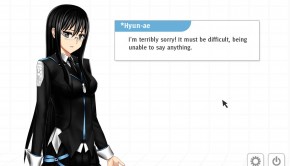Love Week: Twine
There’s been a boom lately in what Ryan North is calling, for legal reasons, “choosable-path adventures.” North successfully Kickstarted an absolutely bonkers choice-driven adaptation of Hamlet titled To Be Or Not To Be, which has been since been adapted into a stage play and an audiobook. And choosable-path adventures have positively exploded in the world of video games with the release of Twine, an easy-to-use editor that lets authors assemble branching-path stories almost as quickly as they can write them.
The traditional fun of a choosable-path adventure is in following one route to see where it takes you – usually to a bitter end – then backtracking to an earlier bookmark (everyone uses them) to see what happens if you do something differently. Certainly, there are well-regarded Twine games that offer just that sort of experience, such as J Chastain’s Rat Chaos or madamluna’s The Temple. The latter bakes the act of dying and retrying right into the story.
 But Christine Love’s two forays into the world of Twine are very different. For one thing, she takes the Twine format and makes it completely her own, giving her games a radical visual makeover and introducing functionality you rarely see elsewhere. Her web design background really shows through; her Twine engine games look as if they could have been made in Flash.
But Christine Love’s two forays into the world of Twine are very different. For one thing, she takes the Twine format and makes it completely her own, giving her games a radical visual makeover and introducing functionality you rarely see elsewhere. Her web design background really shows through; her Twine engine games look as if they could have been made in Flash.
For another, these are not games where one chooses one’s adventure. Both Even Cowgirls Bleed and Magical Maiden Madison have only one ending. (Now’s a great time to play those games, if you haven’t already. Neither takes very long to complete.) The degree of influence the player has over the narrative varies from “slight” to “none.” Which raises the question: why not write them as traditional prose stories? Why make them in Twine at all?
For Even Cowgirls Bleed, the answer is a bit unusual in the context of a text-based choosable-path game: the game has unusually effective and engaging controls. A typical Twine game is navigated using ordinary hyperlinks; move your cursor to a highlighted word and click it to advance. But in Even Cowgirls Bleed, every “clickable” word is a potential target for the protagonist’s hair-trigger pistol. Simply moving your crosshair cursor over it automatically “fires” at the word, causing the story to advance. At times, in lieu of a target to hit, the player is offered a “Holster” button to one side of the screen.
 The result is that the player is put directly in the protagonist’s shoes. The automatic and unavoidable firing mechanism when you aim at a word conveys her eager-yet-inept enthusiasm for being a Wild West sharpshooter. During the passages where nothing much is happening, the “Holster” button alternates between either side of the screen, mimicking the in-game description of you anxiously tossing your pistol from hand to hand. And when the game starts to take a dark turn, you try to carefully thread your crosshairs between the ominous targets to what seems like a safe one, only for the text layout to force the exact misfire you were trying to avoid. Even if the player is not, in fact, a lesbian city slicker with dreams of becoming a cowgirl, the identification reinforced by the synchronicity between the text and the player’s actions is enough to put you into that mindset, however briefly.
The result is that the player is put directly in the protagonist’s shoes. The automatic and unavoidable firing mechanism when you aim at a word conveys her eager-yet-inept enthusiasm for being a Wild West sharpshooter. During the passages where nothing much is happening, the “Holster” button alternates between either side of the screen, mimicking the in-game description of you anxiously tossing your pistol from hand to hand. And when the game starts to take a dark turn, you try to carefully thread your crosshairs between the ominous targets to what seems like a safe one, only for the text layout to force the exact misfire you were trying to avoid. Even if the player is not, in fact, a lesbian city slicker with dreams of becoming a cowgirl, the identification reinforced by the synchronicity between the text and the player’s actions is enough to put you into that mindset, however briefly.
Love’s other Twine game is just as experimental. As far back as Digital: A Love Story, her games have featured the interesting conceit of allowing the player to send and reply to messages, but without any control over what that reply entails. When you “Send a Private Message” to someone on one of Digital’s BBS systems, you instantly receive a “Message sent!” notification but are never told what it was you wrote. If and when you get a response, you can read between the lines to interpret what they might be responding to, but no more.
Magical Maiden Madison is an entire short game of playing with that mechanic. It plays out as a text message conversation between the eponymous magical girl and her best friend Amy about the previous night’s misadventures. As Madison, your input is limited to two choices after each set of messages: Reply or Reply. The difference between them is suggested at the start, when hovering over each option indicates the varying tone, but after that you don’t get any sneak peek at what your choice will make Madison say. The general flow of the conversation and many of Amy’s responses are the same with each playthrough, but it’s up to the player to decide how cheerful or bitter Madison is from line-to-line.
 Though playing up the disconnect between player and avatar is interesting, it results in the less successful of Love’s two Twine games. Magical Maiden Madison bears some similarity to Analogue and Hate Plus in that the player is privy to a recounting of events that have already happened and can’t be changed. It also resembles Don’t Take It Personally in how the protagonist behaves and feels in ways that the player may not. But unlike either of those games (or Even Cowgirls Bleed), the player isn’t present in the narrative in the same way as the Investigator, or John Rook, or the cowgirl. “You” aren’t Madison. You aren’t in the story at all. For that reason, Magical Maiden Madison is the only game in Love’s career that feels like it might have worked better as direct prose.
Though playing up the disconnect between player and avatar is interesting, it results in the less successful of Love’s two Twine games. Magical Maiden Madison bears some similarity to Analogue and Hate Plus in that the player is privy to a recounting of events that have already happened and can’t be changed. It also resembles Don’t Take It Personally in how the protagonist behaves and feels in ways that the player may not. But unlike either of those games (or Even Cowgirls Bleed), the player isn’t present in the narrative in the same way as the Investigator, or John Rook, or the cowgirl. “You” aren’t Madison. You aren’t in the story at all. For that reason, Magical Maiden Madison is the only game in Love’s career that feels like it might have worked better as direct prose.
That said, it’s still a fun story that goes in some unexpected directions, with plenty of snarky magical-girl humor to leaven the proceedings. It’s unfortunately easy to overlook how funny Love’s games can be, but they absolutely are; even if Magical Maiden Madison is her least game-like effort, it still may be her funniest, as Madison complains about her strangely unimpressive power set and a Redditor superhero.
In any case, no matter whether her Twine experiments succeed or fail, Love’s determination to make every game 100% her own shines through clearly. No other Twine games look or play like this, and after playing through dozens of undeniably good Twine games that nevertheless start to blur together, that bit of uniqueness can go a hell of a long way. If you’ve played everything else Love has written and are hungry for more, both of these games deliver.










